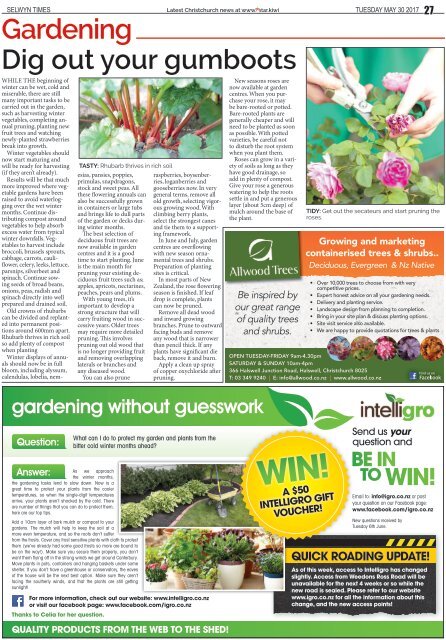You also want an ePaper? Increase the reach of your titles
YUMPU automatically turns print PDFs into web optimized ePapers that Google loves.
SELWYN TIMES Latest Christchurch news at www. .kiwi<br />
Tuesday <strong>May</strong> <strong>30</strong> <strong>2017</strong> 27<br />
Gardening<br />
Dig out your gumboots<br />
TASTY: Rhubarb thrives in rich soil<br />
WHILE THE beginning of<br />
winter can be wet, cold and<br />
miserable, there are still<br />
many important tasks to be<br />
carried out in the garden,<br />
such as harvesting winter<br />
vegetables, completing annual<br />
pruning, planting new<br />
fruit trees and watching<br />
newly-planted strawberries<br />
break into growth.<br />
Winter vegetables should<br />
now start maturing and<br />
will be ready for harvesting<br />
(if they aren’t already).<br />
Results will be that much<br />
more improved where vegetable<br />
gardens have been<br />
raised to avoid waterlogging<br />
over the wet winter<br />
months. Continue distributing<br />
compost around<br />
vegetables to help absorb<br />
excess water from typical<br />
winter downfalls. Vegetables<br />
to harvest include<br />
broccoli, brussels sprouts,<br />
cabbage, carrots, cauliflower,<br />
celery, leeks, lettuce,<br />
parsnips, silverbeet and<br />
spinach. Continue sowing<br />
seeds of broad beans,<br />
onions, peas, radish and<br />
spinach directly into well<br />
prepared and drained soil.<br />
Old crowns of rhubarbs<br />
can be divided and replanted<br />
into permanent positions<br />
around 600mm apart.<br />
Rhubarb thrives in rich soil<br />
so add plenty of compost<br />
when planting<br />
Winter displays of annuals<br />
should now be in full<br />
bloom, including alyssum,<br />
calendulas, lobelia, nemesias,<br />
pansies, poppies,<br />
primulas, snapdragons,<br />
stock and sweet peas. All<br />
these flowering annuals can<br />
also be successfully grown<br />
in containers or large tubs<br />
and brings life to dull parts<br />
of the garden or decks during<br />
winter months.<br />
The best selection of<br />
deciduous fruit trees are<br />
now available in garden<br />
centres and it is a good<br />
time to start planting. June<br />
is the main month for<br />
pruning your existing deciduous<br />
fruit trees such as;<br />
apples, apricots, nectarines,<br />
peaches, pears and plums.<br />
With young trees, it’s<br />
important to develop a<br />
strong structure that will<br />
carry fruiting wood in successive<br />
years. Older trees<br />
may require more detailed<br />
pruning. This involves<br />
pruning out old wood that<br />
is no longer providing fruit<br />
and removing overlapping<br />
laterals or branches and<br />
any diseased wood.<br />
You can also prune<br />
raspberries, boysenberries,<br />
loganberries and<br />
gooseberries now. In very<br />
general terms, remove all<br />
old growth, selecting vigorous<br />
growing wood. With<br />
climbing berry plants,<br />
select the strongest canes<br />
and tie them to a supporting<br />
framework.<br />
In June and July, garden<br />
centres are overflowing<br />
with new season ornamental<br />
trees and shrubs.<br />
Preparation of planting<br />
sites is critical.<br />
In most parts of New<br />
Zealand, the rose flowering<br />
season is finished. If leaf<br />
drop is complete, plants<br />
can now be pruned.<br />
Remove all dead wood<br />
and inward growing<br />
branches. Prune to outward<br />
facing buds and remove<br />
any wood that is narrower<br />
than pencil thick. If any<br />
plants have significant die<br />
back, remove it and burn.<br />
Apply a clean up spray<br />
of copper oxychloride after<br />
pruning.<br />
New seasons roses are<br />
now available at garden<br />
centres. When you purchase<br />
your rose, it may<br />
be bare-rooted or potted.<br />
Bare-rooted plants are<br />
generally cheaper and will<br />
need to be planted as soon<br />
as possible. With potted<br />
varieties, be careful not<br />
to disturb the root system<br />
when you plant them.<br />
Roses can grow in a variety<br />
of soils as long as they<br />
have good drainage, so<br />
add in plenty of compost.<br />
Give your rose a generous<br />
watering to help the roots<br />
settle in and put a generous<br />
layer (about 5cm deep) of<br />
mulch around the base of<br />
the plant.<br />
Be inspired by<br />
our great range<br />
of quality trees<br />
and shrubs.<br />
TIDY: Get out the secateurs and start pruning the<br />
roses.<br />
Growing and marketing<br />
containerised trees & shrubs..<br />
Deciduous, Evergreen & Nz Native<br />
• Over 10,000 trees to choose from with very<br />
competitive prices.<br />
• Expert honest advice on all your gardening needs.<br />
• Delivery and planting service.<br />
• Landscape design from planning to completion.<br />
• Bring in your site plan & discuss planting options.<br />
• Site visit service also available.<br />
• We are happy to provide quotations for trees & plants<br />
OPEN TUESDAY-FRIDAY 9am-4.<strong>30</strong>pm<br />
SATURDAY & SUNDAY 10am-4pm<br />
366 Halswell Junction Road, Halswell, Christchurch 8025<br />
T: 03 349 9240 | E: info@allwood.co.nz | www.allwood.co.nz<br />
gardening without guesswork<br />
Question:<br />
Answer:<br />
As we approach<br />
the winter months,<br />
the gardening tasks tend to slow down. Now is a<br />
great time to protect your plants from the cooler<br />
temperatures, so when the single-digit temperatures<br />
arrive, your plants aren’t shocked by the cold. There<br />
are number of things that you can do to protect them,<br />
here are our top tips.<br />
What can I do to protect my garden and plants from the<br />
bitter cold winter months ahead?<br />
Add a 10cm layer of bark mulch or compost to your<br />
gardens. The mulch will help to keep the soil at a<br />
more even temperature, and so the roots don’t suffer<br />
from the frosts. Cover any frost sensitive plants with cloth to protect<br />
them (we’ve already had some good frosts so more are bound to<br />
be on the way!). Make sure you secure them properly, you don’t<br />
want them flying off in the strong winds we get around Canterbury.<br />
Move plants in pots, containers and hanging baskets under some<br />
shelter. If you don’t have a greenhouse or conservatory, the eaves<br />
of the house will be the next best option. Make sure they aren’t<br />
facing the southerly winds, and that the plants are still getting<br />
sunlight!<br />
for more information, check out our website: www.intelligro.co.nz<br />
or visit our facebook page: www.facebook.com/igro.co.nz<br />
Thanks to celia for her question.<br />
WIN!<br />
a $50<br />
INTEllIgrO gIfT<br />
VOuchEr!<br />
Send us your<br />
question and<br />
BE IN<br />
TO WIN!<br />
Email to: info@igro.co.nz or post<br />
your question on our Facebook page:<br />
www.facebook.com/igro.co.nz<br />
New questions received by<br />
Tuesday 6th June.<br />
QuIck rOadINg updaTE!<br />
as of this week, access to Intelligro has changed<br />
slightly. access from Weedons ross road will be<br />
unavailable for the next 4 weeks or so while the<br />
new road is sealed. please refer to our website<br />
www.igro.co.nz for all the information about this<br />
change, and the new access points!<br />
QualITy prOducTs frOm ThE WEB TO ThE shEd!


















